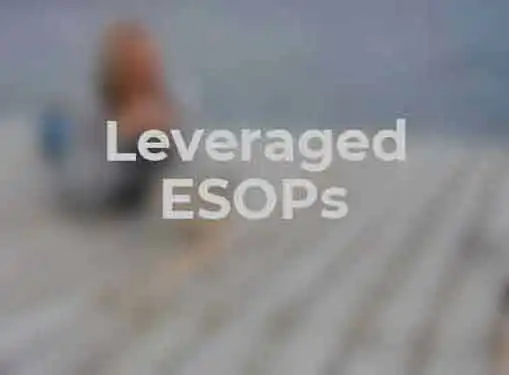ESOP
Leveraged ESOPs
You've heard of ESOPs but are you familiar with the concept of a leveraged ESOP? If not, it might be time to hit the pause button on whatever you're doing and educate yourself about how leveraged ESOPs work and why they are so popular.
Employee stock ownership plans are often thought of as incentive plans to reward and motivate employees.

But that's not the only reason why an ESOP can be a useful resource for a corporate business interest. In some cases, an ESOP can be used to create tax-deductible financing for capital purchases and buyouts.
Leveraged ESOPs are becoming an increasingly common avenue of corporate financing. In a leveraged ESOP, the company borrows money from a lender and then pays back the loan through the ESOP. What makes this form of financing particularly attractive is that it gives the company significant tax advantages compared to other forms of financing.
How It Works
Even though they accomplish the same result, leveraged and non-leveraged ESOPs are set up very differently. In a non-leveraged ESOP, the company makes annual contributions of stock (or cash to purchase stock) into the ESOP. When an employee retires or is separated from service, they receive the stock or its cash value.
But in a leveraged ESOP, the ESOP borrows funds from a bank or lender with a guarantee from the company. These funds can then be used for any number of reasons including the purchase of capital or the buyout of a key shareholder. The company then makes annual contributions to the ESOP, which are in turn used to make payments to the lender. Employees still receive either stock or cash when they leave the company.
Tax Benefits
Leveraged ESOPs result in two significant tax advantages for the corporation:
- All contributions made from a corporation to an ESOP are tax deductible. This includes contributions that are made for the repayment of financing. In essence, a leveraged ESOP enables corporate entities to deduct both the principal and interest portions of loan payments.
- Dividends paid on ESOP may also be deductible. Dividends paid on ESOP stock passed through to employees or used to repay the ESOP loan are tax deductible if the ESOP's sponsor company operates as a C corporation. If the company operates as an S corporation, there is no corporate tax benefit because revenues and expenses flow through to the owners' personal tax returns.
Share this article
Additional Resources for Entrepreneurs


Conversation Board
What's your take on leveraged ESOPs? We welcome your questions, comments and advice.